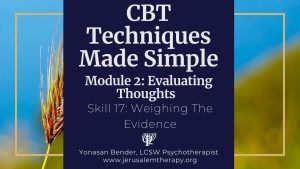If you missed last week’s article, here’s the three take-home points: Wacking your spouse with a foam bat is never a good idea… even if your therapist suggests it, marital satisfaction is shockingly low at 15%, and despite early hiccups in marital therapy (I’m looking at you Dr. Foam Bat Therapist), trailblazers like Gottman revolutionized the field zeroing in on what predicts that 15% and, more prosaically, what predict divorce within a 90% degree of accuracy. So, what makes marriage work?
There’re only four devastating behaviors that wreak havoc on couples and trickle down seriously harming kids. Replacing these with their antidotes equally predicts happy parents and happier kids. Think of these antidotes like the Four Cups of Geulah liberating the entire family out of Mitzryim – Criticism, Contempt, Defensiveness, and Stonewalling.
Reading the list, it seems all too painfully simple. That’s it? Yes… but, like sticking to your diet or making this time the last time you quit smoking, it’s easier said than done. Sticking to this list is an uphill battle against the combined forces of the most overpowering part of your brain, the amygdala, and your trigger-happy nervous system – both geared, by design, to hijack compassion and reason at the drop of a hat.
We used to believe our “natural state” was serene calm until danger is introduced. Now we know this is exactly backwards. Until we’re habituated to our environment, we’re biologically hardwired to vacillate between mild paranoia and sheer terror. Survival is our number one priority as the rest of life depends on that tiny fact. Through the almost instantaneous low-resolution data processing of the amygdala, our brain sacrifices complex reasoning to buy that survival-ensuring speed propelling our fight or flight response wildly forward. In the midst of marital stress, we’re already physically committed to fighting with criticism and contempt or running with defensiveness and stonewalling before we realize what’s going on. Add into this self-defense mix the emotional vulnerability of marriage itself and you’ve got a recipe for disaster.
The first step is seeing these biological processes for what they are. By getting a feel for them, you can begin training yourself to throttle back and reorient yourself to the antidotes of happy marriages getting your thinking brain back in the driver seat. Next week, we’ll outline criticism.
Rabbi Yonasan Bender LCSW graduated from Hebrew University’s School of Social Work. He works with adults, couples, and children from his private therapy practice in Jerusalem. He holds several semichos from Rav Yitzchok Berkovits, shlita. To share your thoughts, experiences, questions, or a different perspective, you can reach Rabbi Yonasan Bender LCSW at 053-808-0435 and at info@jerusalemtherapy.org or check out his website at www.jerusalemtherapy.org.




